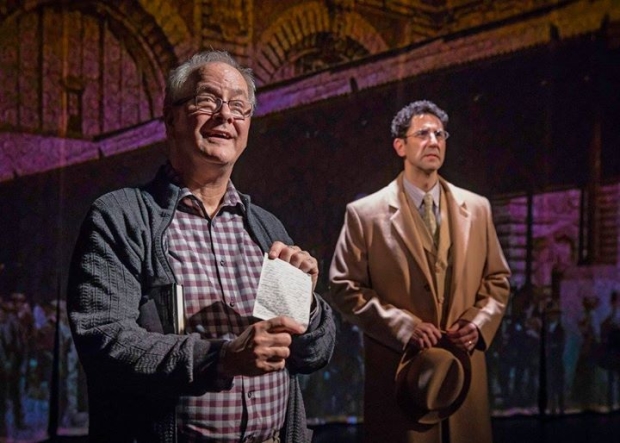
(© Liz Lauren)
The Book of Joseph, now playing Upstairs at Chicago Shakespeare, tells the real-life story of Joseph Hollander (Sean Fortunato), a Jewish Polish lawyer blessed with both the foresight to recognize the rise of fascism in Europe, and the means to escape it. In 1939, Hollander secured visas and passage to Portugal for not only himself, but for 10 members of his family as well. It was an extraordinary achievement, at a time when opportunities to escape dwindled. But other than Joseph's wife, every member of his family refused to join him. They could not believe that their government would abandon them. Or they thought that their wealth and social position would protect them. There are always plenty of attractive reasons to look away from danger.
Act 1 is largely drawn verbatim from the Hollander family's correspondence and court transcripts from Joseph's arduous vetting process, after he arrives as a refugee in the United States. There's a framing story: a lecture given by his son, real-life author Richard Hollander (the steady Francis Guinan who wrote the book Every Day Lasts a Year, the collection of letter and documents on which the play is based). In Act 2, the framing story becomes the primary action, as The Book of Joseph delves into Richard's relationship with his own son (Adam Wesley Brown), and their links to the family legacy. The passing of memories between generations is a poignant topic, and it is tenderly explored here.
Guinan and Brown are an enjoyable father-son team, and the depth of their feelings for each other is always present, even as their bickering rings true. But the emotional anchor of the show is Joseph Hollander, and there could not be a better actor than Sean Fortunato for the role. For most of the play, Joseph is in agony. He stands in relative safety while those he loves march to danger, carried on by their pride and fear? It's unimaginable. But Fortunato's performance is varied, restrained, and utterly free of melodrama. The rest of the Krakow Hollanders are played by a hardworking ensemble of seven, most of whom are double-cast as court officers, interpreters, and, in a particularly touching turn by Patricia Lavery, Joseph's American sweetheart.
Gaines approaches The Book of Joseph with a minimalist touch, allowing the historicity of the script to stand on its own. No bells or whistles are needed; there's barely even a set. Lighting by Philip Rosenberg and projections by Mike Tutaj fill in the visual gaps as Frank's stateless wandering takes him from Romania to Italy to the coast of Portugal to New York. Back in Krakow, the Hollanders are dressed in adaptable costumes by Rachel Healy, with muted tones and clean lines carrying the family from understated sophistication to drab poverty.
This compact show would probably travel well. It certainly deserves to be seen by as many people as possible. As the living memory of the Holocaust disappears, plays like The Book of Joseph, stories that give a face and a heart to an unimaginable series of events, grow more important. If it is at all possible, go see this beautiful, topical production.









